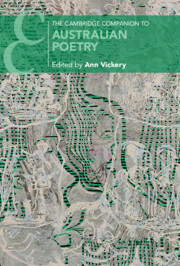Book contents
- The Cambridge Companion to Australian Poetry
- The Cambridge Companion to Australian Poetry
- Copyright page
- Contents
- Figures
- Contributors
- Acknowledgements
- Chronology
- Introduction
- Part I Change and Renewal
- 1 Models of Poet and Nation
- 2 War, Crisis, and Identity in Australian Poetry
- 3 Cultivating Australian Poetry through Periodicals
- Part II Networks
- Part III Authors
- Part IV Embodied Poetics
- Part V Expanding Form
- Further Reading
- Index
- Cambridge Companions To …
- References
1 - Models of Poet and Nation
from Part I - Change and Renewal
Published online by Cambridge University Press: 06 June 2024
- The Cambridge Companion to Australian Poetry
- The Cambridge Companion to Australian Poetry
- Copyright page
- Contents
- Figures
- Contributors
- Acknowledgements
- Chronology
- Introduction
- Part I Change and Renewal
- 1 Models of Poet and Nation
- 2 War, Crisis, and Identity in Australian Poetry
- 3 Cultivating Australian Poetry through Periodicals
- Part II Networks
- Part III Authors
- Part IV Embodied Poetics
- Part V Expanding Form
- Further Reading
- Index
- Cambridge Companions To …
- References
Summary
This chapter considers how understandings of poet and nation in Australia are divided between the settler institutions of literature and poetry and Indigenous traditions. For white Australia, nation functions as a mythic and political collective, while for First Nations people, it is an alien, oppressive framework that ignores sovereignty and is of short historical duration. The chapter considers how colonial and early Federation poets conceived of Australia as a nation in relation to the global North while post-Federation poets like A. D. Hope and Ania Walwicz identify and critique a national consciousness from quite different standpoints. The chapter includes an analysis of a proposed poetic preamble to the Australian Constitution that was defeated by referendum, along with a move to become a republic. The chapter outlines the recognition of Indigenous land rights through the Mabo decision (1992) and its impact on literature. Lastly, it considers how contemporary Aboriginal writer Evelyn Araluen satirically rejects ongoing national mythologies in her recent work, Dropbear (2021).
- Type
- Chapter
- Information
- The Cambridge Companion to Australian Poetry , pp. 21 - 37Publisher: Cambridge University PressPrint publication year: 2024

